- Home
- Robert Hellenga
The Sixteen Pleasures
The Sixteen Pleasures Read online
I would like to thank the National Endowment for the Arts for an Artists Fellowship that made it possible for me to spend six weeks in Florence as I was completing The Sixteen Pleasures as well as the Illinois Arts Council and Knox College for their continuing support of my writing career. I would also like to thank my editor, Laura Hruska, for the role she played in shaping the final version of this book.
The following chapters have been previously published in different form:
Chapter 1, “Where I Want to Be” appeared in Triquarterly (Spring/Summer 1991); Chapter 2, “Pockets of Silence” appeared in The Chicago Tribune (January 29, 1989).
Excerpts from The Divine Comedy by Dante Alighieri, reprinted from The John Ciardi Translation of The Divine Comedy, Dante Alighieri, by permission of W. W. Norton & Company, Inc., Copyright © 1954, 1957, I960, 1961, 1965, 1967, 1970 by John Ciardi; excerpts from I Modi: The Sixteen Pleasures: An Erotic Album of the Italian Renaissance, Tr. and ed. by Lynne Lawner, copyright © 1988 by Northwestern
University Press by permission; portions of “The Road Not Taken” from The Poetry of Robert Frost edited by Edward Connery Lathem. Copyright 1944 by Robert Frost. Copyright 1916, © 1969 by Henry Holt and Company, Inc. Reprinted by permission of Henry Holt and Company, Inc.
Copyright © 1989, 1991, 1994 by Robert R. Hellenga
All rights reserved.
Published by
Soho Press Inc.
853 Broadway
New York, NY 10003
Library of Congress Cataloging-in-Publication Data
Hellenga, Robert, 1941- author.
The sixteen pleasures / Robert Hellenga.
ISBN 978-1-61695-580-9
eISBN 978-1-56947-811-0
1. Librarians—Conservation and restoration—Fiction.
2. Books—Conservation and restoration—Fiction. 3. Erotic drawing—Fiction. I. Title.
PS3558.E4753S59 2015
813’.54—dc23
2014030859
Interior design by Janine Agro, Soho Press, Inc.
Printed in the United States of America
10 9 8 7 6 5 4 3 2 1
To Virginia, Rachel, Heather and Caitrine
1
Where I Want to Be
I was twenty-nine years old when the Arno flooded its banks on Friday 4 November 1966. According to the Sunday New York Times the damage wasn’t extensive, but by Monday it was clear that Florence was a disaster. Twenty feet of water in the cloisters of Santa Croce, the Cimabue crucifix ruined beyond hope of restoration, panels ripped from the Baptistry doors, the basement of the Biblioteca Nazionale completely underwater, hundreds of thousands of volumes waterlogged, the Archivio di Stato in total disarray. On Tuesday I decided to go to Italy, to offer my services as a humble book conservator, to help in any way I could, to save whatever could be saved, including myself.
The decision wasn’t a popular one at home. Papa was having money troubles of his own and didn’t want to pay for a ticket. And my boss at the Newberry Library didn’t understand either. He already had his ticket, paid for by the library, and needed me to mind the store. There wasn’t any point in both of us going, was there?
“Then why don’t I go and you can mind the store?”
“Because, because, because . . .”
“Yes?”
Because it just didn’t make sense. He couldn’t see his way clear to granting me a leave of absence, not even a leave of absence without pay. He even suggested that the library might have to replace me, in which case . . .
But I decided to go anyway. I had enough money in my savings account for a ticket on Icelandic, and I figured I could live on the cheap once I got there. Besides, I wanted to break the mold in which my life was hardening, and I thought this might be a way to do it. Going to Florence was better than waiting around with nothing coming up.
My English teacher at Kenwood High used to say that we’re like onions: you can peel off one layer after another and never get to a center, an inner core. You just run out of layers. But I think I’m like a peach or an apricot or a nectarine. There’s a pit at the center. I can crack my teeth on it, or I can suck on it like a piece of candy; but it won’t crumble, and it won’t dissolve. The pit is an image of myself when I was nineteen. I’m in Sardegna, and I’m standing high up on a large rock—a cliff, actually—and I don’t have any clothes on, and everyone is looking at me, telling me to come down, not to jump, it’s too high.
It’s my second time in Italy. I spent a year here with Mama when I was fifteen, and then I came back by myself, after finishing high school at home, to do the last year of the liceo with my former classmates. Now we’re celebrating the end of our examinations—Silvia (who spent a year with us in Chicago), Claudia, Rossella, Giulio, Fabio, Alessandro. Names like flowers, or bells. And me, Margot Harrington. More friends are coming later. Silvia’s parents (my host family) have a summer house just outside Terranova, but we’re camping on the beach, five kilometers down the coast. The coast is safe, they say, though there are bandits in the centro. Wow!
It’s my birthday—August first—and we’ve had a supper of bluefish and squid that we caught with a net. The squid taste like rubber bands, the heavy kind that I used to chew on in grade school and that boys sometimes used to snap our bottoms with in junior high. Life is sharp and snappy, too, full of promise, like the sting of those rubber bands: I’ve passed my examinations with distinction; I’m going to Harvard in the fall (well, to Radcliffe); I’ve got an Italian boyfriend named Fabio Fabbriani; and I’ve just been skinny-dipping in the stinging cold salt sea.
The others have put their clothes on now—I can see them below me, sitting around the remains of the fire in shorts and halter tops and shirts with the sleeves rolled up two turns, talking, glancing up nervously—but I want to savor the taste/thrill of my own nakedness a little longer, unembarrassed in the dwindling light. It’s the scariest thing I’ve ever done, except coming to Italy in the first place.
Fabio sits with his back toward me while he smokes a cigarette, pretending to be angry because I won’t come down, but when I close my eyes and will him to turn, he puts his cigarette out in the sand and turns. Just at that moment I jump, sucking in my breath for a scream but then holding it, in case I need it later, which I do. I hit the Tyrrhenian Sea feet first, generating little waves that will, in theory, soon be lapping the beaches along the entire western coast of Italy—Sicily and North Africa, too. The Tyrrhenian Sea responds by closing over me and it’s pitch, not like the pool in Chicago where I learned to swim, but deep and dark and dangerous and deadly.
The air in my lungs—the scream that I saved for just such an occasion—carries me up to the surface, and I strike out for the cove, meeting Fabio before I’m halfway there, wondering if like me he’s naked under the water and not knowing for sure till we’re walking waist deep and he takes me by the shoulders and kisses me and I can feel something bobbing against my legs like a floating cork. We haven’t made love yet, but it won’t be long now. O dio mio. The waiting is so lovely. He squeezes my buns and I squeeze his, surprised, and then we splash in to the beach and put on our clothes.
What I didn’t know at the time was that my mother had become seriously ill. Instead of spending the rest of the summer in Sardegna, I had to go back to Chicago, and then, after that, nothing happened. I mean none of the things I’d expected to happen happened. Instead of making love with Fabio Fabbriani on the verge of the Tyrrhenian Sea, I got laid on a vinyl sofa in the back room of SNCC headquarters on Forty-seventh Street. Instead of going to Harvard, I went to Edgar Lee Masters College, where Mama had taug
ht art history for twenty years. Instead of going to graduate school I spent two years at the Institute for Paper Technology on Green Bay Avenue; instead of becoming a research chemist I apprenticed myself to a book conservator in Hyde Park and then took a position in the conservation department of the Newberry Library. Instead of getting married and having a daughter of my own, I lived at home and looked after Mama, who was dying of lung cancer. A year went by, two years, three years, four. Mama died; Papa lost most of his money. My sister Meg got married and moved away; my sister Molly went to California with her boyfriend and then to Ann Arbor. The sixties were churning around me, and I couldn’t seem to get a footing. I tried to plunge in, to get wet, to catch hold, to find a place in one of the boats tossing and turning on the white-water rapids: the sit-ins, the rock concerts, the freedom rides, SNCC, CORE, SDS, the Civil Rights Act, the Great Society. I spent a lot of time holding hands and singing “We shall overcome,” I spent a lot of time buying coffee and doughnuts and rolling joints, and I spent some time on my back, too—the only position for a woman in the Movement.
I’d had no sleep on the plane; my eyes were blurry so it was hard to read; and besides, the story I was reading was as depressing as the view from the window of the train—flat, gray, poor, dreary, actively ugly rather than passively uninteresting. And I kept thinking about Papa and his money troubles and his lawsuits, and about the embroidered seventeenth-century prayer books on my work table at the Newberry that needed to be disbound, washed, mended, and resewn before Christmas for an exhibit sponsored by the Caxton Club.
So I was under a certain amount of pressure. I was looking for a sign, the way some religious people look for signs, something to let them know they’re on the right track. Or on the wrong track, in which case they can turn back. I didn’t know what I was looking for, but I was trying to pay attention, to notice everything—the faces of the two American women sitting opposite me in the compartment, scribbling furiously in their notebooks; the Neapolitan accent of the Italian conductor; the depressing French farmhouses, gray boxes of stucco or cinder block, I couldn’t make out which.
That’s what I was doing—paying attention—when the train pulled into the station at Metz and I saw the Saint-Cyr cadet on the platform, bright as the Archangel Gabriel bringing the good news to the Virgin Mary.
I’d better explain. Papa did all the cooking in our family. He started when Mama went to Italy one summer when I was nine—it was right after the war—to look at the pictures, to see for herself what she’d only seen in the Harvard University Prints series and on old three-by-four-inch tinted slides that she used to project on the dining room wall; and when she came back he kept on doing it. My sisters and I did the dishes and Papa took care of everything else, day in and day out, and whether it was Italian or French or Chinese or Malaysian, it was always wonderful, it was always special. Penne alla puttanesca, an arista tied with sprigs of rosemary, paper-thin strips of beef marinated in hoisin sauce and Szechwan peppercorns, whole fresh salmon poached in white wine and finished with a mustard sauce, chicken thighs simmered in soy sauce and lime juice, curries so fiery that at their first bite unwary guests would clutch their throats and cry out for water, which didn’t help a bit. Those were our favorites, the standards against which we measured other dishes; but our very favorite treat of all was the dessert Papa made on our birthdays, instead of cake, which was supposed to look like the hats worn by cadets at Saint-Cyr, the French military academy. We’d never been to Saint-Cyr, of course, but we would have recognized a cadet anywhere in the world, if he’d been wearing his hat.
That’s why I was so startled when I looked out the window of the Luxembourg-Venise Express and saw my cadet standing there on the platform—the young man Papa had teased me about, the Prince Charming who had never materialized. He was holding a suitcase in one hand and shifting his weight back and forth from one foot to the other, as if he had to go to the bathroom, and his parents were talking at him so intensely that I thought for a minute he was going to miss the train. And his hat! I couldn’t believe it was a real hat and not a frozen mousse of chocolate and egg whites and whipped cream with squiggly Italian meringues running up and down the sides for braids. That hat stirred something inside me, made me feel I was doing the right thing and that I ought to keep going, that things would work out. Just to make sure I closed my eyes and willed him into the compartment, just as I had once willed Fabio Fabbriani to turn and watch me plunge feet first into the sea. As I was willing him into the compartment I was willing the American women out of it—not making my cadet’s appearance contingent on their departure, however, because I was pretty sure they weren’t going to budge. I kept my face down in my book and waited, eyes closed lightly, listening to the noises in the corridor.
I was, I suppose, still operating, at least subconsciously, on a fairy-tale model of reality: I was Sleeping Beauty, or Snow White, waiting for some prince whose romantic kisses would awaken my full feelings, liberate my stormy senses, emancipate my drowsy and constrained imagination, take me back to that last Italian summer.
The train was already in motion when the door of the compartment finally opened. I kept my eyes closed another two seconds and then looked up at—not my Prince Charming but the Neapolitan conductor, an old man so frail I’d had to help him hoist the American women’s mammoth suitcases onto the overhead luggage rack. These suitcases were to luggage what Burberrys are to rainwear—lots of extra pockets and straps and mysterious zippers concealed under flaps.
I asked him about the Saint-Cyr cadet.
“The next compartment,” he said. “Not your type. Too young. You need an older man like me.”
“You’re already married.”
He shrugged, putting his whole body into it, arms, hands, shoulders, head cocked, stomach pulled in.
“Better tell your friends”—we were speaking in Italian—“that the dining car will be taken off the train before we cross the border. You need to reserve a seat early.”
I nodded.
“Unless,” he went on, “they have those valises stuffed with American food. Porcamattina.” He glanced upward at the suitcases, tapped his cheekbone with an index finger and was gone.
I felt for these American women some of the mixed feelings that the traveler feels for the tourist. On the one hand you want to help, to show off your superior knowledge; on the other you don’t want to get involved. I didn’t want to get involved. They weren’t my type. These were saltwater women—sailors, golfers, tennis players, clubwomen with suntans in November, large limbed, confident, conspicuous, firm, trim, sleek as walruses in their worsted wool suits. They reminded me of the Gold Coast women who used to show up at around the edges of CORE demonstrations, with their checkbooks open, telling us how much they admired what we were doing, and how they wished they could help more. All fucked up ideologically, according to our leaders at SNCC: “They think their shit don’t stink.”
As far as they knew, I was a scruffy little Italian—I hadn’t spoken a word of English in their presence, and I was reading an Italian novel—and it was too late to undeceive them. I had heard too much.
I knew, for example, that they’d met the previous summer at some kind of writing workshop at Johns Hopkins University and that they’d both jumped into the sack with their instructor, a novelist named Philip. I knew that Philip was bald but well hung (“like a shillelagh”). I knew that neither of them had done it dog fashion BP (“before Philip”) and that they were traveling second class because Philip had told them they’d get more material that way for the stories they were going to write now that they were divorced.
Part of their agenda, I gathered, was to notice things, to pay attention. Maybe they were looking for signs, too, maybe not; in either case they seemed to be trying to impress the details of European railroad travel onto the pages of their marbled composition books by sheer physical force. Nothing escaped their notice, not even the signs, in
French, German and Italian, warning passengers not to throw things out the window and not to pull the cord on the signal d’alarme. All the details went into their notebooks—the fine of not less than 5,000 FF, the prison term of not less than one year. And when one noticed something, the other did, too: the instructions on the window latch, the way the armrests worked, the captions on the faded views of Chartres Cathedral that hung on the walls of the compartment above the backs of the seats. (I was tempted to look at them myself, but I didn’t want to give myself away or interrupt their game.)
I kept my nose in my book—Natalia Ginzburg’s Lessico famigliare. It was a strenuous hour, and I was glad when, simultaneously, panting like dogs after a good run, they closed their notebooks and resumed their conversation.
Yolanda: Did you get the old man with the pipe?
Ruth: Got him.
Yolanda: The emergency stop?
Ruth: Got it.
Yolanda: The sheep?
Ruth: What sheep? I didn’t see any sheep.
Yolanda: Hah! (Licking her finger and scoring off an imaginary line in the air.) There were six sheep in somebody’s yard.
Ruth: Oh, shit. I wish Philip were here.
Yolanda: You can have Philip; I’ll take the guy with the
funny hat.
Ruth: What guy?
Yolanda: Back in Metz.
Ruth: Not fair.
Yolanda: How do you really feel about Philip? Do you think he just used us? I mean, who would have thought that first day—
Ruth: Do you suppose he screwed Alice, too? She’s the one who really needed it. And how about Helga?
Yolanda: Helga, maybe. Alice, no. Too old. No talent.
Ruth: Do you suppose that’s why he teaches those workshops?
Yolanda: Do you suppose that’s why we went? (A silence.)
Ruth: I think I got a lot out of it. I mean besides a roll in the hay. I mean, I think I’m getting my head together, noticing a lot of stuff I never noticed before.

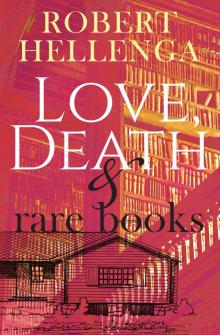 Love, Death & Rare Books
Love, Death & Rare Books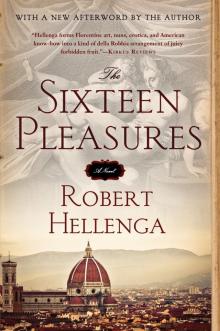 The Sixteen Pleasures
The Sixteen Pleasures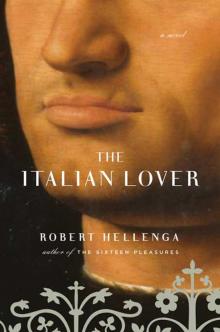 The Italian Lover
The Italian Lover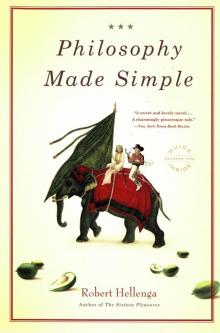 Philosophy Made Simple
Philosophy Made Simple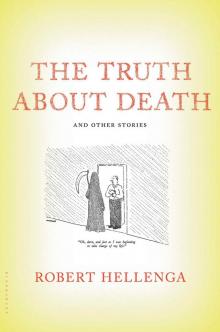 The Truth About Death
The Truth About Death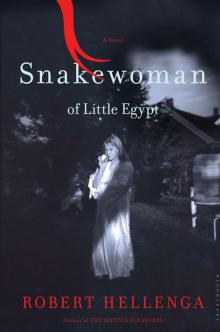 Snakewoman of Little Egypt
Snakewoman of Little Egypt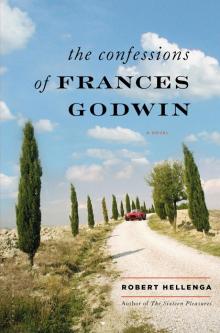 The Confessions of Frances Godwin
The Confessions of Frances Godwin